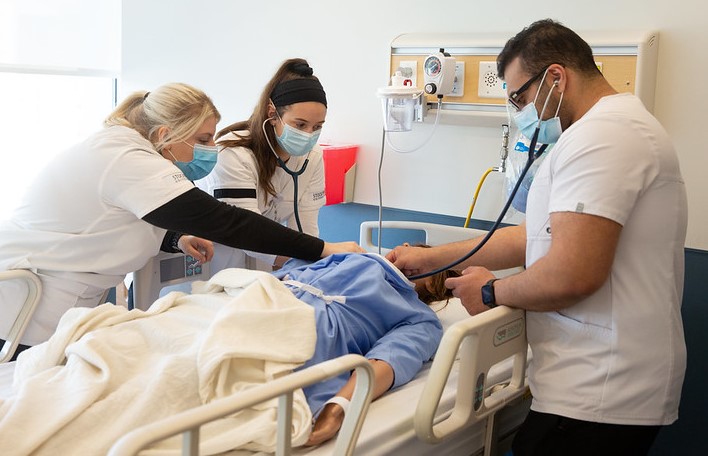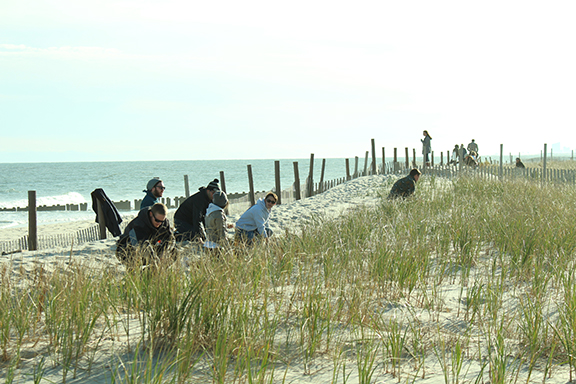Courses in Manahawkin
22796-CIST 1206-011
An applied approach to the study of statistics, emphasizing statistical thinking with
business, economic, and health applications. Topics: descriptive statistics, basic
probability, one-sample inferential statistics, and selected topics from multivariate
analysis. MS Excel based.
20873-GIS 3612-001
An integrated study of the culture, history and environment associated with coastal
beaches. The course will consider scientific, historical, economic, artistic, recreational,
and political perspectives on the ocean's beaches and the human developments and endeavors
these landforms have spawned. A comparative study of East Coast beaches, shore communities,
and resorts will be included.
23547-NURS 4150-001
This course is designed to clarify the practice, and capture the essence, of community
health nursing. Concepts of professional nursing are synthesized with concepts of
public health, epidemiology, and the social, physical and behavioral sciences and
are applied to professional nursing in community settings. Processes, forces and stressors,
such as human diversity, the environment, ethics and politics, that affect health
and utilization of health care delivery systems across the life span, are assessed
and analyzed. Roya's Adaptation Model is utilized to implement a holistic approach.
23557-NURS 4350-001
While didactic and clinical focus remains on the physiological mode, self-concept,
role function and interdependence modes will be included so that the senior student
appreciates adaptations required by all adult clients from diverse backgrounds. The
nursing process and principles of disease prevention, health promotion, health restoration,
health maintenance and end of life care complements the principles of care of the
acutely ill adult. Clinical decision making utilizing scientific principles, ethical
principles, leadership, collaboration, delegation and evidence-based nursing knowledge
are synthesized in clinical practice.
23563-NURS 4450-001
This capstone course provides a forum for becoming familiar with, and developing the
skills, to evaluate a variety of professional, legal, political, technical and ethical
issues confronting the professional nurse. The study of economic aspects and designs
of health care systems, both nationally and internationally, will enhance knowledge
of problems in culturally diverse health systems. Career management and professional
growth focus will provide the professional nurse with a foundation for continuing
and developing competencies. Students develop their own self-concept, role function
and interdependence mode strengths in order to enhance professional effectiveness.
23527-NURS 3150-001
The physiological mode is the focus of study in this clinical course. Adults facing
adaptations to their health and illness status are the target population. Students
will apply Roy's Model in designing and implementing care for adults in long term
care and acute care settings. Selected chronic illness and common acute illness care
are studied and the roles of health promotion, disease prevention, health restoration,
health maintenance and end of life care are integrated. The nursing implemented when
caring for the young adult, the middle adult and the older adult from diverse ethnic
groups.
23546-NURS 3450-001
The use of research as a means of gathering data for refining an extending nursing
practice is examined. Critique of research studies is carried out to determine applicability
of findings to nursing interventions. Students explore the formation of research questions,
the appropriateness of research design, and literature review. Focus is on the importance
of evidence-based practice, accountability, responsibility, and development of nursing
science.
23508-NURS 2150-001
This foundation course introduces the student to the philosophy of the Nursing program
at Stockton University and the major concepts of professional nursing: person, health,
environment and nursing. The Roy's Model of Adaptation Nursing provides the basis
upon which to build nursing knowledge. Effective communication principles, nursing
process, critical thinking, clients' rights, nursing standards and the value of evidence-based
practice provides a foundation for further study. Students learn the varied roles
necessary for professional practice. Clinical practice issues integrate asepsis, client
safety and documentation. Selected clinical skills and medical terminology are course
components.
23509-NURS 2155-001
23510-NURS 2155-002
24377-NURS 2155-004
23511-NURS 2155-003
23518-NURS 2250-001
This course will develop skills in health assessment. Health history taking and physical
assessment skills will be studied and practiced using the Roy Adaptation Model. Assessment
will include physical, developmental, psychosocial, nutritional, and cultural aspects.
Students will be expected to incorporate the concepts of human diversity where appropriate.
While this course will focus on the assessment and beginning planning and documentation
phases of the nursing process, effective therapeutic nursing communication, interventions,
and outcomes will be included. Therapeutic nursing interventions will include concepts
of health promotion, disease prevention, and health restoration across the life span.
Critical thinking skills and ethical considerations are included in the course focus.
23519-NURS 2255-001
23520-NURS 2255-002
24379-NURS 2255-003
23521-NURS 2255-003
23524-NURS 2350-001
This course explores the mechanisms of disease and alterations in body defenses of
all body systems. The general principles governing inflammation, repair and immunity
and the diseases of organ systems are presented. Genetic control and environmental
influences provide the foundation for exploration of systems disorders. The role of
fluid and electrolyte balance in the development of pathology is discussed
23526-NURS 2450-001
This course provides a comprehensive overview of basic principles of pharmacology.
The terms, concepts, and principles of pharmacodynamics and pharmacokinetics are applied
to those requiring adaptation to disease processes. Emphasis is on therapeutic, adverse
and toxic effects of medication usage and human health issues. Legal and ethical aspects
of pharmacology are presented with emphasis on safe administration of medications
in a variety of forms and settings.


Currently registering for classes?
Click Here to view class modality types (in-person classes on campus, hybrid classes that combine in-person and online lessons, and completely online classes).


